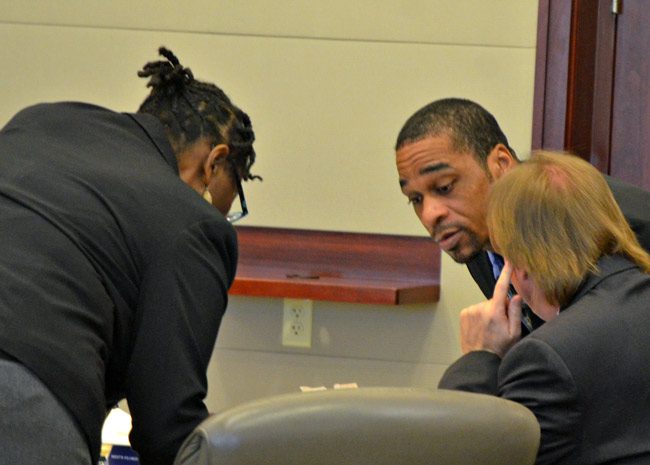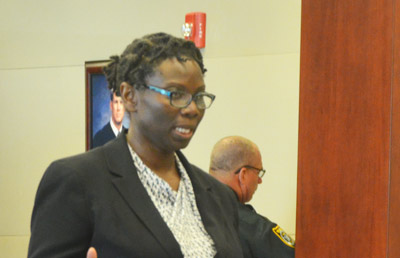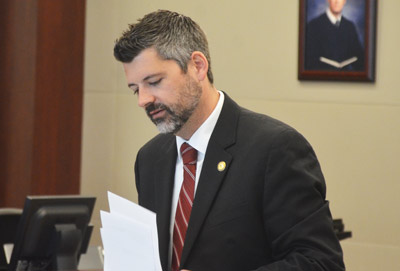
It is a trial so unusual, so rife with blurred lines and blurred memories, that the prosecution and defense could have swapped some of the very same lines in their opening arguments.
Assistant State Attorney Joe LeDonne summed up the case to the jury in a five-minute opening, itself unusually short, though he could have kept it to the one sentence he spoke at the beginning and the end of his opening: “He had no reason to be there,” LeDonne said of James A. Taylor, the 39-year-old man on trial accused of molesting an 11-year-old child three and a half years ago in Palm Coast. “It was the middle of the night, he touched her and he rubbed her in her chest area. That’s what this case is about.”
Aside from the statement that he had no reason to be in the girl’s bedroom, the defense all but agreed with the rest of the statement, and in fact incorporated the statement in a motion for acquittal halfway through the day today, after the prosecution had rested, after it had put on its only four witnesses: the child and alleged victim herself, now 14, her two sisters, 16 and 18, and their mother.
Taylor is on trial on a first-degree felony charge of lewd and lascivious molestation of a girl younger than 12. He could face 30 years in prison if convicted. It’s not clear when the girl made the charge, only that one night sometime between November and December 2013, Taylor, who was the girl’s live-in “boyfriend or husband” (that was never made clear) entered the bedroom where the girl shared a bed with her sister, touched her “for a couple of seconds,” in the girl’s words, over her clothes, in the chest area, and left when she stirred.
That’s what the prosecutor meant when he repeated that the whole case rests on that moment: nothing else. That’s why Steve Gosney, one of the two public defenders on the case, stood before Circuit Judge Dennis Craig at midday, after the jury was ushered out, and asked for an acquittal. Defense attorneys routinely do so at some point in the trial, but in this case there was more than routine in play: the prosecution’s witnesses had made a poor showing even after the oldest of the three sisters made an allegation that should be devastating to Taylor, but that has no bearing on the case at hand. The jury must consider only the charge resulting from the allegation about Taylor’s act on the youngest child.

(© FlaglerLive)
The prosecutor countered. “I don’t know what parent sneaks around in the middle of the night, in the shadows, avoiding the light, and touches the breast area of your child especially if you’re not related to the child, a child of the ages of 11 or 10 years old,” LeDonne said. “This was more than just a parental touch.” The jury, he said, should make the determination. Not the judge.
“I just think that that is absurd,” Gosney said. “Every parent checks their child at night. You’re not going to flip on this light, come storming in and say, ‘Hey, kid, you’re awake?’ You’re going to sneak in and make sure that child is in their bed like they should be, not sleeping with the dog that shouldn’t be in their bedroom, they’re sleeping in there and you’re going to make sure that they’re there, that’s a common parental thing. I do that all the time with my son, he’s put pillows in there, he’s up playing on the computer, I have to get him back down and put him back in bed. That is a common, parental—I don’t know where, what parent we’re talking about here from the state.”
The judge denied the motion, referring to intent, though the judge also knows things the jury does not, and will not, know. He knows Taylor’s history. It is not a wholesome one. Taylor has been in and out of prison over the years, with two previous charges of rape and kidnapping, one of them involving a 15-year-old girl, and charges of burglary and conspiracy to commit armed robbery, among others. He faces a child-rape charge in Gainesville, involving the same family, but the oldest of the three sisters.
She testified to that allegation today, claiming Taylor raped her when she was 12, though as with her younger sister, her testimony was somewhat inconsistent (particularly regarding her age at the time of the alleged rape). Unlike her younger sister, the older sister became belligerent toward Regina Nunnally, the defense attorney, as the 18-year-old outright refused eight or 10 times to let Nunnally “refresh your memory” by reading from depositions the 18 year old had given previously. The defense attorney of course made no allowance for the usual gaps and trip-ups in anyone’s memory when events several years old are being recalled, or when current memory is tested against what may or may not have been said during formal depositions or interviews by the Child Protection Team—all of which can be intimidating or traumatic for children at the time, and difficult to recall years hence.
But the defense’s job is to plunder the credibility of the prosecution’s witnesses without heed for their age or sensibilities.

Still, by then Nunnally had successfully etched the portrait of three sisters who disliked the man their mother was living with, a man whose discipline they did not want or like and whom they considered more of an impostor than a parent despite whatever trips he took them on, whatever pictures they took with him in the frame, whatever kindness he showed them when others were present, or whatever support he provided their mother, ostensibly enabling her to “get back on her feet,” as Nunnally described it, without going into details. The defense attorney was doing nothing less than implying, with the totality of the testimony, that the sisters had made up their story to get back at Taylor: she was blaming the alleged victims.
The sum total of Nunnally’s cross-examination of the prosecution’s witnesses proved more effective—at least for Taylor’s defense—than what sparsely incriminating details LeDonne had elicited from the younger girl or her sisters regarding the charge at hand. She had focused her opening argument on a metaphor: that the prosecution was building its case on a foundation of shifting sands. She had essentially filled in that metaphor as the day wore on, using the prosecution’s witnesses to do so, and with her own witnesses yet to take the stand. Taylor’s parents, the only spectators in the courtroom aside from the alleged victim and her victim’s advocate—they sat a few feet behind their son, the closest they’d been able to be to him for such long stretches since his incarceration at the Flagler County jail in October 2015, at the cost to taxpayers of roughly $60,000, not counting trial costs–were likely satisfied with what was unfolding.
By the time in early afternoon when the two sides discussed what charges the jury may consider once it begins deliberations, it became entirely feasible that one of those “lesser” charges they may choose to convict Taylor on, rather than lewd and lascivious molestation, could be simple battery: a misdemeanor. (In fact, by the time instructions were read to the jury on Wednesday, that option had been removed at the defense’s request.)
The jury was ushered in and out of the courtroom at least a half dozen times along the way to ensure that what the witnesses said remained between clear bounds, with nothing so much as hints about Taylor’s criminal past or his status as a sexual offender allowed. It was the older sister’s slip along just those lines two weeks ago that resulted in a mistrial. This time, she and the other witnesses made sure to comply with the judge’s admonishment just before the trial started, as he lined them up in front of him and laid down the rules: Anything about negative history of Mr. Taylor is going to be off limits,” Craig told the witnesses. The same will apply to the defense’s witnesses.
So the trial will go on. But it didn’t do so Tuesday. When it was time for the defense to call the first witness, in early afternoon, there was no witness to call. The defense had miscalculated, assuming it wouldn’t need its witnesses until Wednesday (most of them are in Gainesville). It was the defense’s only miscalculation of the day.





























South Florida says
Leanne is a joke of a prosecutor. He wouldn’t take my rape case and he takes this one that’s turned into a simple battery.